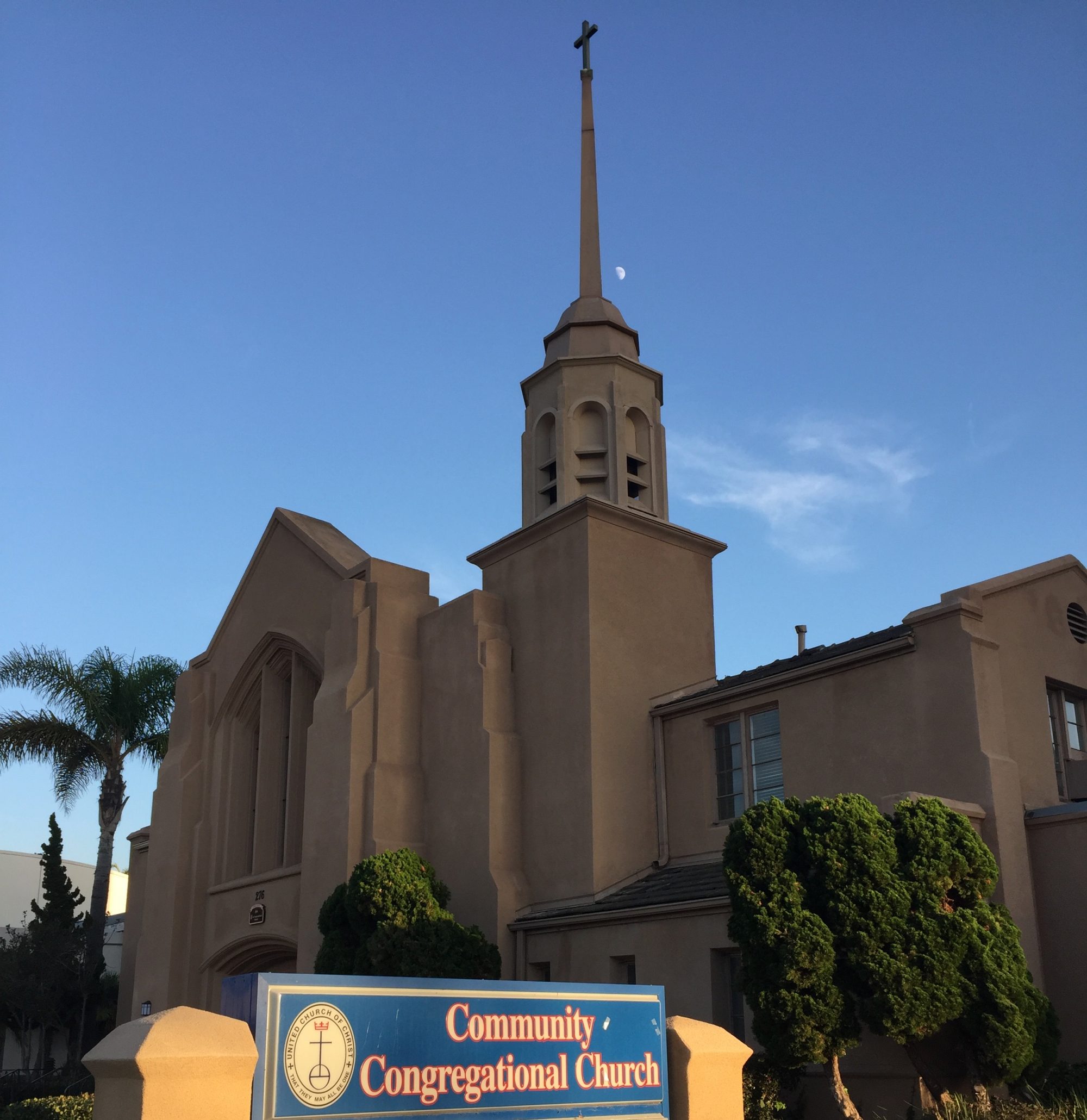“A Pause for More Thanksgiving”
A meditation based on Luke 17:11-19
November 26, 2017
Community Congregational Church of Chula Vista
Dr. Sharon R. Graff
* * * * *
Today is a day not too often experienced in the Christian year…it is a pause, on a Sunday, for even more thanksgiving! Usually, we go right from Thanksgiving Sunday (last week) directly into Advent. But not this year. This year, the calendar gives us a blissful extra Sunday before the waiting of Advent begins next week. And with this extra Sunday of giving thanks, we’ve read one of Jesus’ best teachings on the topic of gratitude.
The story of the ten lepers, healed by Jesus, with emphasis on the one who returns to give thanks, is a story that inspires some questions. Was Jesus teaching a lesson on good manners? Always give thanks…go out of your way to show appreciation… practice gratitude and you will be rewarded. After all, Jesus does say to the one who returns thanks, “Get up and go on your way; your faith has made you well.” And yet, the other nine were healed, too, even without Jesus remarking on their faith or them returning to him to say thank you. So it seems more than manners and more than faith that Jesus is teaching here.
Perhaps Jesus was showing us that healing sneaks up, sometimes unobserved, like it did for that one man. Verse 15: “Then one of them, when he saw that he was healed, turned back, praising God with a loud voice.” That verse packs a lot in! The man was, like the other nine, following Jesus’ instructions to go to the priests. Along the way, the man looked and noticed he was healed. Can you imagine that moment? The unbelievable shake of the head. The stop-in-his-tracks sudden jolt of this new reality. He was healed. No more leprosy. The condition, which had isolated him—socially, legally, religiously—isolated him from his community, from his family—that condition disappeared while he was walking away from Jesus and toward those priests. Healing is like that, isn’t it? We notice it, sometimes bit by bit, often in a flash of insight. The pain is gone. The wrong committed to us or by us is no longer a heavy weight on our shoulders. The doctor says all tests are go. In that moment of awareness, our bodies rejoice! And, if we are awake, spiritually awake, like that one former-leper was awake, then we turn our attention immediately toward God and gratitude.
In our day, we are fortunate to live in a time where scientists continue to repeatedly prove the benefits of gratitude. A few years ago, Harvard Health Medical School published an article that delineated gratitude’s health benefits. A couple of leading scientific experts in the field of gratitude, asked three groups of people to write a few sentences each week about their lives over the past seven days. One group wrote about things they were grateful for that had occurred during the week. A second group wrote about daily irritations or things that had displeased them, and the third wrote about events that had affected them (with no emphasis on them being positive or negative). After 10 weeks, those who wrote about gratitude were more optimistic and felt better about their lives. Surprisingly, they also exercised more and had fewer visits to physicians than those who focused on sources of aggravation. Harvard Health reported that most studies published on gratitude support that association between gratitude and a person’s general well-being.
Forbes.com picked up on this, and in 2014, they published a variety of research that revealed seven benefits of regularly practicing gratitude.
- Gratitude opens the door to more relationships and new opportunities.
- Gratitude improves physical health.
- Gratitude improves psychological health, by reducing a multitude of toxic emotions, ranging from envy and resentment to frustration and regret.
- Gratitude enhances empathy and reduces aggression. Grateful people are more likely to behave in a positive manner, even when others around them behave less kind; and people who practice gratitude are less likely to retaliate against others, have more empathy and a decreased desire to seek revenge.
- Grateful people sleep better.
- Gratitude improves self-esteem. Rather than becoming resentful toward people who have more money or better jobs—which is a major factor in lower self-esteem—grateful people are able to appreciate other people’s accomplishments.
- Gratitude increases mental strength. For years, research has shown gratitude not only reduces stress, but it may also play a major role in overcoming trauma. A study found that Vietnam War Veterans with higher levels of gratitude experienced lower rates of Post-Traumatic Stress Disorder. Another study found that gratitude was a major contributor to resilience following the terrorist attacks on September 11. Recognizing all you have to be thankful for—even during the worst times of your life—gratitude seems to foster resilience.
The Forbes article concluded, “gratitude may be one of the most overlooked tools that we all have access to every day. Cultivating gratitude doesn’t cost any money and it certainly doesn’t take much time, but the benefits are enormous.”
Earlier this year, there was an article published in Greater Good Magazine, a journal dedicated to science-based insights to help us live more meaningful lives. That article indicated what we’ve seen already this morning, plus more. While the practice of gratitude is clearly beneficial for those of us who are already relatively healthy, Greater Good showed that gratitude also benefits those of us with mental health concerns. They invited a group of adults who were seeking counseling services for depression or anxiety to add to their therapy…by writing one letter of gratitude to someone each week for three weeks. Two other groups were asked to write other things. The results showed that those who wrote 3 letters of gratitude had significantly better mental health four weeks and 12 weeks after their writing exercise ended. This suggests that gratitude writing can be beneficial for all of us, whether we struggle with mental health concerns or not. In fact, it seems, practicing gratitude on top of receiving psychological counseling carries greater benefits than counseling alone, even when that gratitude practice is brief.
And that’s not all. When the researchers dug deeper into their results, they found preliminary indications that gratitude might actually work on our minds to increase our neural sensitivity in the parts of the brain associated with learning and decision-making. More surprising, these changes in brain activity were evident on MRIs three months after those gratitude notes were written.
Sisters and brothers, Jesus was onto something! When he said to the healed and grateful former leper, “your faith has made you whole,” maybe Jesus wasn’t talking about faith in the traditional religious way. Maybe, just maybe, Jesus was pointing to the benefits of practicing gratitude…of believing in those benefits…of using gratitude as a way to improve our health—in body, mind and spirit.
One more bit of anecdotal research, and it is from my own life. Years ago, when our family was going through a most difficult year, I was reading a daily devotional book that recommended starting a gratitude journal. I did so. Nearly every night, before heading to sleep, I wrote a list of 10 things I was grateful for that day. Some nights that was a challenge. Other nights, not so much. By the end of the year, I had survived, and I’m not sure I would have as well without that gratitude journal. In addition to the professional therapeutic help our family sought and received, that regular practice of forcing myself to see through the muck to acknowledge the people and places and events and things for which I was grateful, that practice literally saved me.
To this day, I continue a daily gratitude journal, and I encourage you to do the same. Yours may be a list, a letter, a photo, or simply a mental note of your appreciation for another. Your gratitude can take the form of a prayer, meditation or simply taking time to count your blessings from the day just past. A regular practice of gratitude can be anything that serves to put you in a place of gratitude, as happened for that once-leprous, now-healed man in the first-century world of Jesus. He saw himself healed; he turned around and gratefully acknowledged it before God and anyone else with ears; his faith in the healing benefits of gratitude is what saved him, “made him whole,” Jesus said. Friends in Christ, the same is true for us…take a pause for even more thanksgiving!
Amen and Blessed Be!

